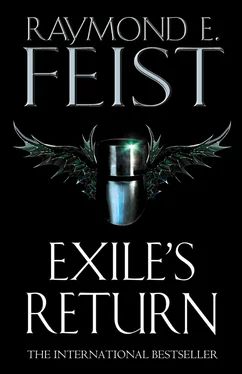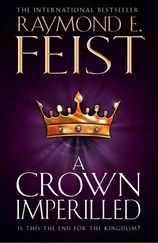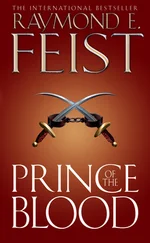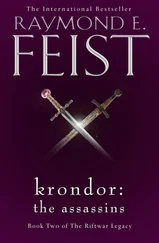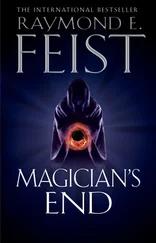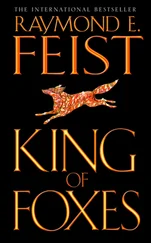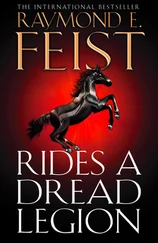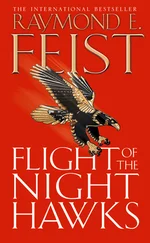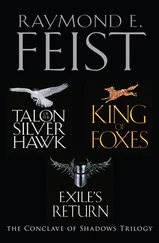RAYMOND E. FEIST
Exile’s Return
Book Three of Conclave of Shadows

HarperVoyager
An Imprint of HarperCollins Publishers 77–85 Fulham Palace Road, Hammersmith, London W6 8JB
www.harpervoyagerbooks.com
First published by HarperVoyager 2004
Copyright © Raymond E. Feist 2004
Cover illustration © Nik Keevil
Raymond E. Feist asserts the moral right to be identified as the author of this work
A catalogue record for this book is available from the British Library
All rights reserved under International and Pan-American Copyright Conventions. By payment of the required fees, you have been granted the nonexclusive, nontransferable right to access and read the text of this ebook on screen. No part of this text may be reproduced, transmitted, downloaded, decompiled, reverse engineered, or stored in or introduced into any information storage and retrieval system, in any form or by any means, whether electronic or mechanical, now known or hereinafter invented, without the express written permission of HarperCollins e-books.
HarperCollins Publishers has made every reasonable effort to ensure that any picture content and written content in this ebook has been included or removed in accordance with the contractual and technological constraints in operation at the time of publication.
Source ISBN: 9780002246835
EBook Edition © AUGUST 2012 ISBN: 9780007373796
Version: 2014–09–08
This one’s for James, with all the love a father can give.
May see thee now, though late, redeem thy name, And glorify what else is damned to fame.
Richard Savage
Character of Foster
Cover
Title Page
Copyright
Dedication
Epigraph
Map
Chapter One: Captive
Chapter Two: Survival
Chapter Three: Farm
Chapter Four: Village
Chapter Five: Soldier
Chapter Six: Opportunity
Chapter Seven: Decision
Chapter Eight: Commander
Chapter Nine: Murder
Chapter Ten: Westward
Chapter Eleven: Maharta
Chapter Twelve: Ratn’gary
Chapter Thirteen: The Pillars of Heaven
Chapter Fourteen: Keepers
Chapter Fifteen: Kalkin
Chapter Sixteen: Sulth
Chapter Seventeen: Home
Chapter Eighteen: Confrontation
Chapter Nineteen: Consultation
Chapter Twenty: Elvandar
Chapter Twenty-One: Conflagration
Chapter Twenty-Two: Assault
Epilogue: Missions
Keep Reading
Continue the Adventure …
Acknowledgements
About the Author
Also by the Author
About the Publisher
T HE RIDERS CAME AT HIM.
Kaspar, who had until the day before held the title of Duke of Olasko, waited, holding his chains ready. Moments before he had been deposited on this dusty plain by a tall white-haired magician who, with only a few words of farewell, had vanished, leaving the exiled nobleman to face an approaching band of nomads.
Kaspar had never felt this alive and vitalized. He grinned, took a deep breath and flexed his knees. The riders were fanning out, and Kaspar knew they judged him a risk even though he stood alone, barefoot and without any weapon save for heavy chains with manacles and leggings attached to each end.
The riders slowed. Kaspar counted six of them. They wore alien garments, loose-fitting outer robes of indigo over white blouses belted at the waist with whipcord; ballooning trousers were tucked into black leather boots. Their heads were covered by wrapped turbans, with a length of cloth left hanging on the right. Kaspar judged that this could be quickly raised to cover mouth and nose against a sudden dust storm or to hide identity. The clothing looked less like a uniform than tribal garb, he decided. And they carried a variety of lethal-looking weapons.
The leader spoke in a language Kaspar didn’t understand, though there was something oddly familiar about it. Kaspar replied, ‘I don’t suppose there’s the remotest chance you speak Olaskon?’
The man Kaspar had identified as the leader said something to his companions, made a gesture, then sat back to watch. Two men dismounted and approached Kaspar, drawing weapons. A third behind them unwound a leather cord, with which he obviously intended to bind their new captive.
Kaspar let his chains drop slightly, and slumped his shoulders, as if acknowledging the inevitability of his circumstances. From the manner in which they approached, Kaspar knew two things: these were experienced fighting men – tough, sunburned plainsmen who probably lived in tents – and they were not trained soldiers. One glance gave Kaspar the one fact he needed to make his decision on how to act. None of the three men still on horseback had drawn a bow.
Kaspar allowed the man with the leather bindings to approach, and then at the last instant he kicked out, taking the man in the chest. That man was the least dangerous of the three at hand. Kaspar then swung his chains, releasing an end at the same instant, and the swordsman on his right who had judged himself out of Kaspar’s reach was slammed across the face with the makeshift weapon. Kaspar heard bone crack. The man went down silently.
The other swordsman was quick to react, raising his sword and shouting something – an insult, battle cry, or prayer to a god, Kaspar didn’t know which. All the former duke knew was that he had perhaps three or four seconds to live. Instead of moving away from the attacker, Kaspar threw himself at the man, coming up hard against him as the sword fell through empty air.
He got his shoulder under the man’s armpit and the momentum of the missed blow carried the nomad over Kaspar’s shoulder. Kaspar’s powerful arms pushed up hard and the man spun through the air, landing hard upon the ground. The breath seemed to explode out of his body and Kaspar suspected he might have cracked his spine.
Kaspar sensed more than saw that two archers were unlimbering their bows, so he sprang forward, and with a diving shoulder roll, came to his feet holding the closest man’s sword. The nomad who had held the binding leather was trying to come to his feet and draw his own sword at the same time as Kaspar stepped by him, smashing the man’s head with the flat of the blade. The man fell over without a sound.
Kaspar might not be the swordsman Tal Hawkins had been, but he had trained as a soldier most of his life, and now he was in his element, in-close brawling. He ran at the three riders, two with bows and one with a slender lance, that man levelling his weapon as he put his heels to his horse’s barrel. The animal might not be a seasoned warhorse but it was well trained. It leapt forward as if sprinting from the starting line in a race and Kaspar barely avoided being trampled. He almost took the point of the man’s lance in the chest, but with a quick move to the left evaded it. Had the horse started only a yard or two farther back, he would have been moving too fast for Kaspar’s next move, which was to continue twisting and reaching up with his left hand, grab the rider by the back of his robe and yank him from the saddle.
Kaspar didn’t wait to see the man hit the ground, but used his momentum to keep turning until he was facing the closest rider, who was trying to draw his bow. Kaspar reached out with his left hand and grabbed the man’s ankle. He yanked it back and then up and the bowman fell from the saddle.
Читать дальше
